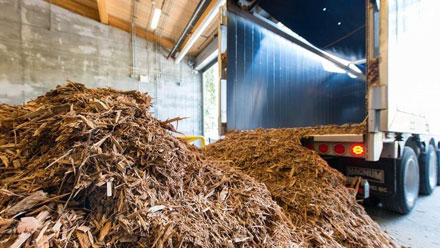
Manufacturing giant Boral is pressing ahead with research into creating a bio-refinery in New South Wales using its hardwood sawmill residues. The $1.2 million feasibility study aims to determine the technical and financial viability of building a second-generation bio-refinery that would produce renewable diesel fuel and bitumen. Source: Philip Hopkins for Timberbiz
Funding for the study comes from the Australian Renewable Energy Agency ($500,000), with Boral providing the other $700,000.
Steve Dadd, Executive General Manager of Boral Timber, said the company had been looking for sometime for a value-added use of timber residues from its six northern NSW coast timber mills.
The residues, previously exported to Japan for pulp and paper, are currently used for landscaping, boiler fuel and other low-value applications.
Mr Dadd said only a small percentage of the hardwood timber became high-value products such as decking and flooring.
“There are a lot of leftovers from forest to mill. No supply chain in the world can survive if such a small percentage of its resource ends up in products,” he told Daily Timber News.
The company had decided that biomass for energy was a “pretty good option” for hardwood.
“It’s a fairly concentrated resource, is already at the sawmills, and the freight is expensed already expensed. A lot of energy is stored in hardwood in particular,” he said. “There are also some new and clever technologies to convert it to useable bioenergy products.”
Mr Dadd said traditional thinking was to turn wood waste into pellets and burn it for electricity. However, exporting such electricity back into the grid received low feed-in tariff rates – lower than cost of electricity back to you.
“It’s better than nothing, but not a good solution. A lot of capital is locked up as well,” he said.
Mr Dadd said the company was looking closely at liquid transport fuels – renewable diesel. “Diesel is a valuable product. No matter what the world does with electric vehicles, all freight, mining and others will consume vase quantities of diesel for a long time,” he said. “Diesel is in short supply, and it will get more expensive.”
The study is considering a mechanical catalytic conversion technology, developed by Spain-based Global Ecofuel Solutions SL, which could be combined with the potential bio-refinery at Boral’s hardwood timber mill at Herons Creek near Port Macquarie.
If the study is successful, the proposed bio-refinery, which would cost about $50 million to build, could convert up to 50,000 tonnes of waste sawmill residue annually to renewable diesel and bitumen.
“It’s early days, but the trials and support from government and the technology providers looking very promising. We are already working with a pilot plant in Europe; the next step would be a full-production facility,” Mr Dadd said.
“We don’t know the timing of that. The beauty of this technology is, it can be the right size for reasonably small volumes – not like an oil refinery where you need a billion-dollar investment. This (the bio-refinery) is an order of magnitude smaller than that. It works on a decentralised model.”
Mr Dadd said Boral ran a large trucking and off-road fleet of about 5000 vehicles. It was the second biggest freight operator in the country, with off-road quarries, mines and timber mills, he said.
The company estimates that the volume of timber residues could create about 16 million litres of diesel and 8000 tonnes of bitumen annually. This would account for up to 15% of Boral’s annual diesel needs. Bitumen, another by-product, could be used in Boral’s asphalt business.
“We have to build a business case for this. We must make sure it works technically. We are talking about fully compatible, 100% diesel that can go in to any vehicle,” Mr Dadd said.
One thing that could get in the way of the business plan, he said, was what Japan and Europe may do to the residue market for wood fibre.
“The Japanese Government has introduced enormous feed-in tariffs to electricity generators to create renewable electricity in the aftermath of Fukushima when the nuclear industry was turned on its head,” Mr Dadd said.
ARENA chief executive, Ivor Frischknecht, said renewable liquid fuels provided the best chance to decarbonise heavy transport sectors. These included aviation, shipping and rucking.
“We hope Boral’s trial is successful and leads other companies to build bio-refineries to turn waste materials into valuable products,” he said.





